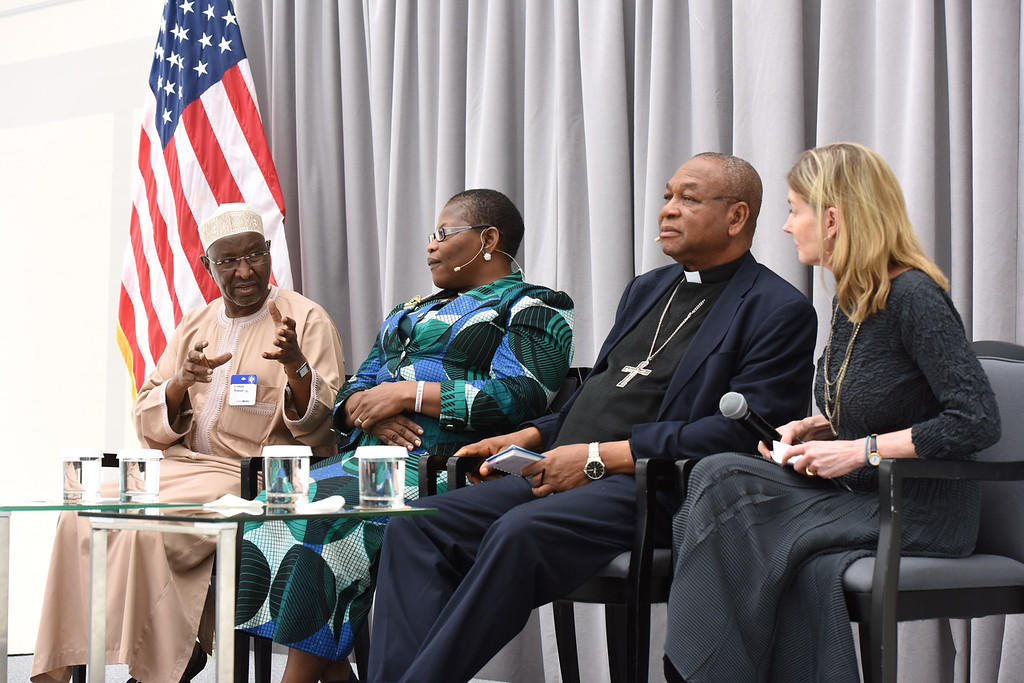Nigerian Civic Leaders Assert a Role Against Violence
11 Eminent Figures Build the Voice of a ‘Senior Working Group’
As Nigeria struggles to calm violent conflicts nationwide, including the Boko Haram insurgency, 11 eminent civil society leaders are summoning government officials to seek an unprecedented degree of citizen input on policy. Prominent religious, military, academic and diplomatic figures say that, as an early step, they will urge state legislatures to hold formal public hearings, not a common Nigerian practice, to address some of the disputes that have caused bloodshed in recent years. The move comes after the group visited Washington and attended a congressional hearing on Nigeria’s violence.

The leaders include a former army chief, the country’s Roman Catholic cardinal and the Sultan of Sokoto, Nigeria’s most prominent Muslim religious figure. Known as the Senior Working Group, the leaders recently published a joint declaration on Nigeria’s various violent conflicts, from the Boko Haram insurgency in the mainly Muslim north to separatist agitation in the southeast and new turmoil over crude oil extraction in the long-turbulent Niger River Delta.
The working group was convened last year to provide advice to state governors from the country’s north on ways to end violence in their region. Under Nigeria’s federal system, the country’s 36 states hold significant power.
The Senior Working Group “is emerging as a potentially influential, collective voice in Nigeria’s effort to improve governance in ways to end and prevent these violent conflicts,” said Oge Onubogu, who leads Nigeria programs at the U.S. Institute of Peace. USIP helped assemble the group last year and connect it with the northern governors.
“The current state of Nigeria reflects a hotbed of internal conflicts that threaten the sovereignty and legitimacy of the nation-state,” the group wrote in its declaration, published in August in a national newspaper, the Premium Times. A “growing gap between the rich and poor, beyond poverty itself, generates anti-government sentiments that are easily manipulated to fuel civil unrest, and drive wedges between communities that have coexisted in the region for decades,” they declared.
Public Hearings in Nigeria
The group’s support for Nigerian legislators to establish a consistent pattern of public hearings on the country’s conflicts followed a week-long visit they made to Washington this month in which they attended a hearing of Congress’ human rights commission. The commission heard testimony from four independent organizations, including USIP, on Nigeria’s communal and political violence.
“These Nigerian civil society leaders saw and heard how the congressmen actually engaged American civil society actors, the depth of questioning and discussion back and forth,” Onubogu said. “I think they were struck by how fully government officials, legislators, were consulting civic organizations about questions of policy.”
In Washington, Under Secretary of State Tom Shannon told the Senior Working Group that the United States wants to partner with a broad Nigerian effort—one that includes both the government and civil society—to bring stability to Africa’s demographic and economic giant. “I want to acknowledge … your efforts and commitment as peacebuilders,” Shannon told the group in a meeting at USIP. “Your work to defuse conflicts over a range of issues from elections to land use inspires us all.”
The Senior Working Group’s visit to Washington helped build its growing cohesion, Onubogu said. “These leaders are very active in their domains, whether it’s Nigeria’s religious communities or the military and security sectors or academia. But they don’t have many opportunities to engage across the boundaries of their separate fields. This group is letting them do that, to build a broader, civic role in engaging Nigeria’s government.”
Members of the group plan to promote public hearings in Nigeria’s policymaking as they meet this month with legislators in Kaduna, one of the Nigerian states that has suffered repeated flare-ups of communal violence.



